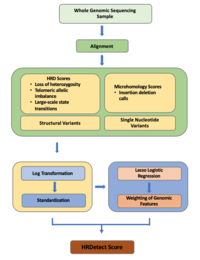
Photo from wikipedia
Background This study sought to estimate the prognostic effect of intratumoral heterogeneity (ITH) and Yes-associated protein 1 (YAP1) intensity in human epidermal growth factor receptor 2 (HER2) positive breast cancer… Click to show full abstract
Background This study sought to estimate the prognostic effect of intratumoral heterogeneity (ITH) and Yes-associated protein 1 (YAP1) intensity in human epidermal growth factor receptor 2 (HER2) positive breast cancer patients. We also investigated individualized adjuvant therapy for YAP1-sufficient patients and HER2 heterogeneous patients. Methods The relationship between prognostic outcomes and clinicopathological variables in 1,650 retrieved breast cancer patients was evaluated. The HER2 intensity and YAP1 expression in HER2-ITH and non-ITH (NITH) patients were also estimated. All patients were followed-up, regardless of whether or not they received intensive treatment, to explore individualized adjuvant therapy for YAP1-sufficient patients and HER2 heterogeneous patients. Results Over-expression and nuclear localization of YAP1 were significant in HER2-ITH patients. The over-expression of YAP1 and the presence of ITH affected the prognosis of HER2 positive patients. YAP1 intensity and lymph nodes metastases was more obviously affected the survival of HER2-ITH patients, while the prognosis of NITH patients were correlated with clinical Tumor-Node-Metastasis (cTNM) stage and lymph-vascular space invasion (LVSI) status. HER2-NITH patients and YAP1-insufficient patients benefited from a combination of Trastuzumab and Pertuzumab/Lapatinib, while Capecitabine significantly decreased the relapse risk of ITH patients and YAP1-sufficient patients. Conclusions YAP1 overexpression and nuclear localization was usually observed in HER2-ITH patients. For HER2-NITH patients, an advanced stage of cTNM and LVSI status increased the recurrent risk, and intensified Pertuzumab or Lapatinib treatment (combination with Trastuzumab) improved their survival. For HER2-ITH patients, the overexpression of YAP1 and pathological lymph nodes (pLN) metastases increased recurrent risk, and intensified Capecitabine treatment improved their survival. YAP1 overexpression contributed to a poor prognostic outcome, especially when HER2 signal intensity was insufficient.
Journal Title: Gland surgery
Year Published: 2022
Link to full text (if available)
Share on Social Media: Sign Up to like & get
recommendations!